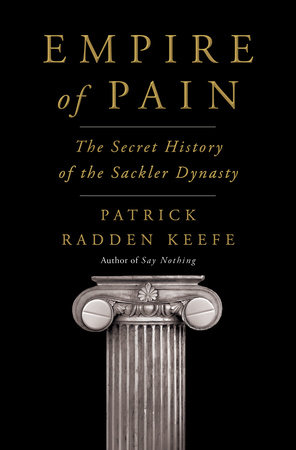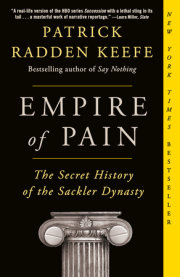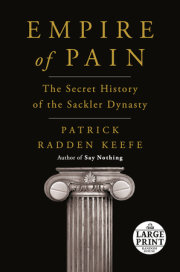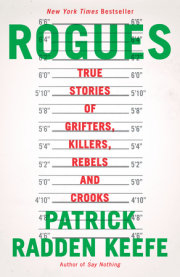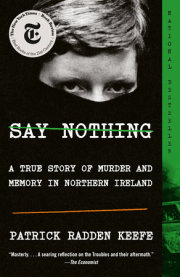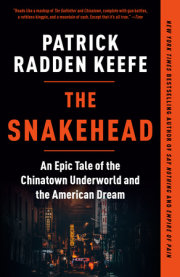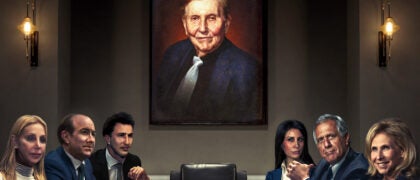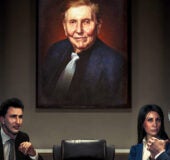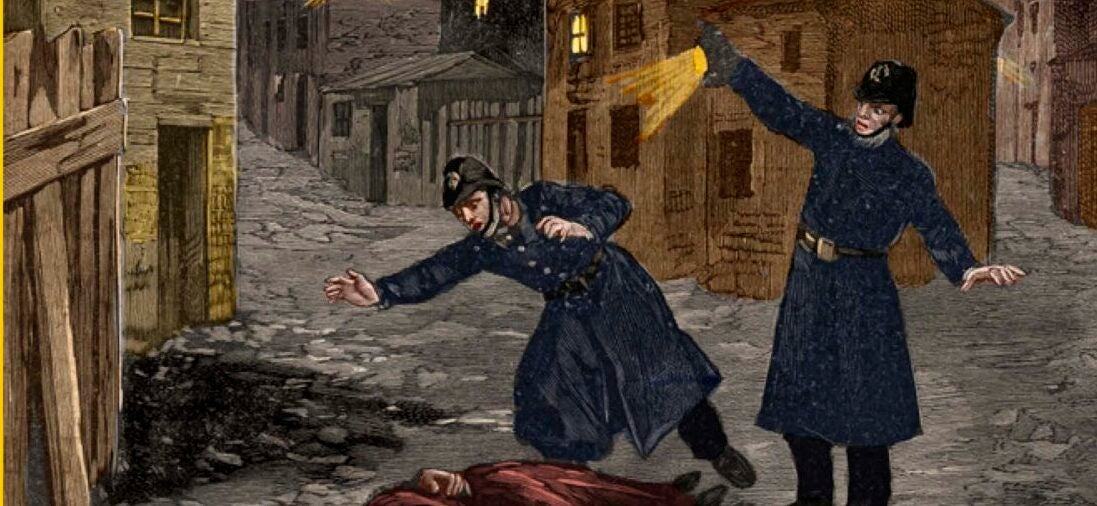Chapter 1
A Good Name
Arthur Sackler was born in Brooklyn, in the summer of 1913, at a moment when Brooklyn was burgeoning with wave upon wave of immigrants from the Old World, new faces every day, the unfamiliar music of new tongues on the street corners, new buildings going up left and right to house and employ these new arrivals, and everywhere this giddy, bounding sense of becoming. As the firstborn child of immigrants himself, Arthur came to share the dreams and ambitions of that generation of new Americans, to understand their energy and their hunger. He vibrated with it, practically from the cradle. He was born Abraham but would cast off that old-world name in favor of the more squarely American-sounding Arthur. There’s a photo, taken in 1915 or 1916, of Arthur as a toddler, sitting upright in a patch of grass while his mother, Sophie, reclines behind him like a lioness. Sophie is dark-haired, dark-eyed, and formidable. Arthur stares straight at the camera, a cherub in short pants, his ears sticking out, his eyes steady and preternaturally serious, as though he already knows the score.
Sophie Greenberg had emigrated from Poland just a few years earlier. She was a teenager when she arrived in Brooklyn in 1906 and met a mild-mannered man nearly twenty years her senior named Isaac Sackler. Isaac was an immigrant himself, from Galicia, in what was then still the Austrian Empire; he had come to New York with his parents and siblings, arriving on a ship in 1904. Isaac was a proud man. He was descended from a line of rabbis who had fled Spain for central Europe during the Inquisition, and now he and his young bride would build a new beachhead in New York. Isaac went into business with his brother, operating a small grocery store at 83 Montrose Avenue in Williamsburg. They called it Sackler Bros. The family lived in an apartment in the building. Three years after Arthur was born, Isaac and Sophie had a second boy, Mortimer, and four years after that, a third, Raymond. Arthur was devoted to his little brothers and fiercely protective of them. For a time, when they were small, all three brothers shared a bed.
Isaac did well enough in the grocery business that the family soon moved to Flatbush. A bustling neighborhood that felt like the heart of the borough, Flatbush was considered middle class, even upper middle class, compared with the far reaches of immigrant Brooklyn, like Brownsville and Canarsie. Real estate was the great benchmark in New York, even then, and the new address signified that Isaac Sackler had made something of himself in the New World, achieving a degree of stability. Flatbush felt like a place you graduated to, with tree-lined streets and solid, spacious apartments. One of Arthur’s contemporaries went so far as to remark that to Brooklyn Jews of that era it could seem that other Jews who lived in Flatbush were “practically Gentiles.” With his earnings from the grocery business, Isaac invested in real estate, purchasing tenement buildings and renting out apartments. But Isaac and Sophie had dreams for Arthur and his brothers, dreams that stretched beyond Flatbush, beyond even Brooklyn. They had a sense of providence. They wanted the Sackler brothers to leave their mark on the world.
If Arthur would later seem to have lived more lives than anyone else could possibly squeeze into one lifetime, it helped that he had an early start. He began working when he was still a boy, assisting his father in the grocery store. From an early age, he evinced a set of qualities that would propel and shape his life—a singular vigor, a roving intelligence, an inexhaustible ambition. Sophie was clever, but not educated. At seventeen she had gone to work in a garment factory, and she would never fully master written English. Isaac and Sophie spoke Yiddish at home, but they encouraged their sons to assimilate. They kept kosher, but rarely attended synagogue. Sophie’s parents lived with the family, and there was a sense, not uncommon in any immigrant enclave, that all the accumulated hopes and aspirations of the older generations would now be invested in these American-born kids. Arthur in particular felt the weight of those expectations: he was the pioneer, the firstborn American son, and everyone staked their dreams on him.
The vehicle for achieving those dreams would be education. One fall day in 1925, Artie Sackler (he went by Artie) arrived at Erasmus Hall High School on Flatbush Avenue. He was young for his class—he had just turned twelve—having tested into a special accelerated program for bright students. Artie was not one to be easily cowed, but Erasmus was an intimidating institution. Built by the Dutch in the eighteenth century, the original structure was a two-story wooden schoolhouse. In the first years of the twentieth century, the school expanded, around that ancient schoolhouse, to include a quadrangle in the style of Oxford University with castle-like neo-Gothic buildings clad in ivy and adorned with gargoyles. This expansion was designed to accommodate the great surge of immigrant children in Brooklyn. The faculty and students at Erasmus saw themselves as occupying the vanguard of the American experiment and took the notion of upward mobility and assimilation seriously, providing a first-class public education. The school had science labs and taught Latin and Greek. Some of the teachers had PhDs.
But Erasmus was also enormous. With some eight thousand students, it was one of the biggest high schools in the country, and most of the students were just like Arthur Sackler—the eager offspring of recent immigrants, children of the Roaring Twenties, their eyes bright, their hair pomaded to a sheen. They surged into the corridors, the boys dressed in suits and red ties, the girls in dresses with red ribbons in their hair. When they met under the great vaulted entrance arch during the lunch hour, it looked, in the words of one of Arthur’s classmates, like a “Hollywood cocktail party.”
Arthur loved it. In history class, he found that he admired and related to the Founding Fathers, and particularly Thomas Jefferson. Like Jefferson, Artie had eclectic interests—art, science, literature, history, sports, business; he wanted to do everything—and Erasmus put a great emphasis on extracurriculars. There must have been a hundred clubs, a club for practically everything. On a late afternoon in winter, when classes had ended for the day and dark had fallen, the whole school was lit up, windows blazing around the quad, and as you walked the corridors, you would hear the sounds of one club or another being convened: “Mr. Chairman! Point of order!”
In later life, when he spoke of these early years at Erasmus, Arthur would talk about “the big dream.” Erasmus was a great stone temple to American meritocracy, and most of the time it seemed that the only practical limitation on what he could expect to get out of life would be what he was personally prepared to put into it. Sophie would prod him about school: “Did you ask a good question today?” Arthur had grown up to be gangly and broad-shouldered, with a square face, blond hair, and eyes that were blue and nearsighted. He had tremendous stamina, and he needed it. In addition to his studies, he joined the student newspaper as an editor and found an opening in the school’s publishing office, selling advertising for school publications. Rather than accept a standard pay arrangement, Arthur proposed that he receive a small commission on any ad sale he made. The administration agreed, and soon Arthur was making money.
This was a lesson he learned early, one that would inform his later life in important ways: Arthur Sackler liked to bet on himself, going to great lengths in order to devise a scheme in which his own formidable energies might be rewarded. Nor was he content with the one job. He set up a business to handle photography for the school yearbook. After selling advertising space to Drake Business Schools, a chain specializing in postsecondary clerical education, he proposed to the company that they make him—a high school student—their advertising manager. And they did.
His inexhaustible gusto and restless creativity were such that he always seemed to be fizzing with new innovations and ideas. Erasmus issued “program cards” and other pieces of humdrum curricular paperwork to its eight thousand students. Why not sell advertising on the back of them? What if Drake Business Schools paid for rulers branded with the company name and issued them to Erasmus students for free? By the time Arthur was fifteen, he was bringing in enough money from these various hustles to help support his family. He was accumulating new jobs more quickly than he could work them, so he started to hand some of them off to his brother Morty. Initially, Arthur felt that Ray, as the youngest, shouldn’t have to work. “Let the kid enjoy himself,” he would say. But eventually, Ray took jobs, too. Arthur arranged for his brothers to sell advertising for The Dutchman, the student magazine at Erasmus. They persuaded Chesterfield cigarettes to run ads aimed at their fellow students. This generated a nice commission.
For all of its orientation toward the future, Erasmus also had a vivid connection to the past. Some of the Founding Fathers whom Artie Sackler so revered had been supporters of the school he now attended: Alexander Hamilton, Aaron Burr, and John Jay had contributed funds to Erasmus. The school was named after the fifteenth-century Dutch scholar Desiderius Erasmus, and in the library a stained-glass window celebrated scenes from his life. The window had been completed just a few years before Arthur arrived, dedicated to “the great man whose name we have carried for a hundred and twenty-four years.” Each day, Arthur and his fellow students were inculcated with the idea that they would eventually take their place in a long line of great Americans, a continuous line that stretched back to the country’s founding. It didn’t matter that they lived in cramped quarters or wore the same threadbare suit every day, or that their parents spoke a different language. This country was theirs for the taking, and in the span of a single lifetime true greatness could be achieved. They spent their days at Erasmus surrounded by traces of great men who had come before, images and names, legacies etched in stone.
In the center of the quad, the ramshackle old Dutch schoolhouse still stood, a relic of a time when this part of Brooklyn had all been farmland. When the wind blew in the wintertime, the wooden beams of the old building would creak, and Arthur’s classmates joked that it was the ghost of Virgil, groaning at the sound of his beautiful Latin verses being recited in a Brooklyn accent.
Arthur’s hyperactive productivity in these years might have stemmed in part from anxiety: while he was at Erasmus, his father’s fortunes began to slip. Some of the real estate investments went bad, and the Sacklers were forced to move into cheaper lodging. Isaac bought a shoe shop on Grand Street, but it failed and ended up closing. Having sold the grocery in order to finance his real estate investments, Isaac was now reduced to taking a low-paying job behind the counter at someone else’s grocery store, just to pay the bills.
Arthur would later recall that during these years, he was often cold but never hungry. Erasmus had an employment agency to help students find work outside school, and Arthur began to take on additional jobs to support the family. He got a newspaper route. He delivered flowers. He didn’t have time to date or attend summer camp or go to parties. He worked. It would become a point of pride for him that he never took a holiday until he was twenty-five years old.
Even so, in stray moments, Arthur glimpsed another world—a life beyond his existence in Brooklyn, a different life, which seemed close enough to touch. From time to time, he would take a break from his frenetic schedule and trot up the stone steps of the Brooklyn Museum, through the grove of Ionic columns and into the vast halls, where he would marvel at the artworks on display. Sometimes, his delivery jobs would take him into Manhattan, all the way uptown to the gilded palaces of Park Avenue. At Christmas, he would deliver great bouquets of flowers, and as he walked along the broad avenues, he would peer through brightly lit windows into the apartments and see the twinkle of Christmas lights inside. He loved the sensation, as he entered a big doorman building, his arms full of flowers, of stepping off the frigid sidewalk and getting enveloped in the velvet warmth of the lobby.
When the Great Depression hit in 1929, Isaac Sackler’s misfortune intensified. All of his money had been tied up in his tenement properties, and now they were worthless: he lost what little he had. On the streets of Flatbush, forlorn-looking men and women joined breadlines. The employment agency at Erasmus started accepting applications not just from students but from their parents. One day, Isaac called his three sons together. With a defiant flash of the old family pride, he informed them that he would not be going bankrupt. He had marshaled his meager resources responsibly and had at least been able to pay his bills. But he had nothing left. Isaac and Sophie desperately wanted their sons to continue their education—to go to college, to keep climbing the ladder, to do everything that a young man with ambition in America was supposed to do. But Isaac did not have the money to pay for it. If the Sackler boys were going to get an education, they would have to finance it themselves.
It must have been painful for Isaac to say this. But he insisted that he had not given his children nothing. On the contrary, he had bestowed upon them something more valuable than money. “What I have given you is the most important thing a father can give,” Isaac told Arthur, Mortimer, and Raymond. What he had given them, he said, was “a good name.”
When Arthur and his brothers were children, Sophie Sackler would check to see if they were sick by kissing them on the forehead to take their temperature with her lips. Sophie had a more dynamic and assertive personality than her husband and a very clear sense, from the time that her children were little, of what she wanted for them in life: she wanted them to be doctors.
“By the time I was four, I knew that I was going to be a physician,” Arthur later said. “My parents brainwashed me about being a doctor.” Both Sophie and Isaac regarded medicine as a noble profession. During the nineteenth century, many doctors had been perceived as snake oil salesmen or quacks.
Copyright © 2022 by Patrick Radden Keefe. All rights reserved. No part of this excerpt may be reproduced or reprinted without permission in writing from the publisher.





